
Leucadendron tinctum, the spicy conebush, is a flower-bearing shrub that belongs to the genus Leucadendron and forms part of the fynbos. The plant is native to the Western Cape, where it occurs in the Hex River Mountains up to Hottentots Holland Mountains and Langeberg. The shrub grows 1.3 m tall and bears flowers from July to August.
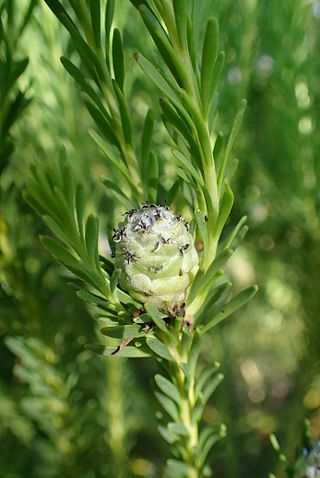
Leucadendron linifolium, the line-leaf conebush, is a flower-bearing shrub that belongs to the genus Leucadendron and forms part of the fynbos. The plant is native to the Western Cape, South Africa.

Leucadendron chamelaea, the Witsenberg conebush, is a flower-bearing shrub that belongs to the genus Leucadendron and forms part of the fynbos. The plant is native to the Western Cape, South Africa.
Leucadendron cinereum, the scraggly conebush, is a flower-bearing shrub that belongs to the genus Leucadendron and forms part of the fynbos. The plant is native to the Western Cape where it occurs from Hopefield and on the Cape Flats from the Berg River estuary to Kraaifontein.

Leucadendron concavum, the Pakhuis conebush, is a flower-bearing shrub that belongs to the genus Leucadendron and forms part of the fynbos. The plant is native to the Western Cape where it occurs at the Pakhuis Pass in the Cederberg.

Leucadendron rourkei, the Uniondale conebush, is a flower-bearing shrub belonging to the genus Leucadendron and forms part of the fynbos. The plant is native to the Western Cape and Eastern Cape, South Africa. The plant is rare.

Leucadendron sorocephalodes, the woolly conebush, is a flower-bearing shrub belonging to the family Proteaceae. It is part of the South African fynbos vegetation type. The plant is native to the Western Cape and Eastern Cape where it occurs from the Outeniqua Mountains to the Baviaanskloof Mountains.
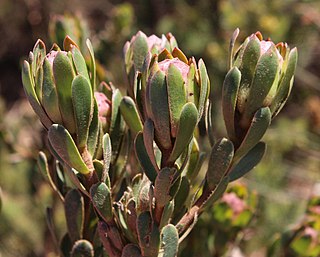
Leucadendron stelligerum, the Agulhas conebush, is a flower-bearing shrub that belongs to the genus Leucadendron and forms part of the fynbos. The plant is native to the Western Cape where it occurs from Elim to the Agulhas Plain.
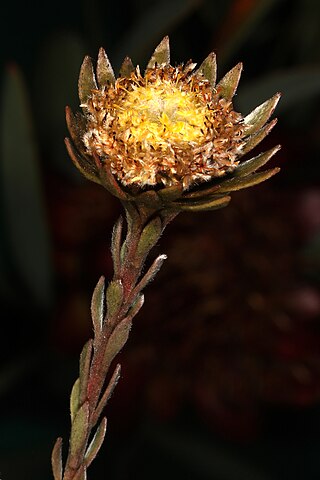
Leucadendron nitidum, the Bokkeveld conebush, is a flower-bearing shrub that belongs to the genus Leucadendron and forms part of the fynbos. The plant is native to the Western Cape where it occurs at Cederberg, Koue Bokkeveld and Swartruggensberge.

Leucadendron loeriense, the Loerie conebush, is a flower-bearing shrub that belongs to the genus Leucadendron and forms part of the fynbos. The plant is native to the Western Cape, where it is found in the Elandsberg, Baviaanskloof and Groot-Winterhoek mountains. The shrub grows 2.5 m tall and flowers in December and January.
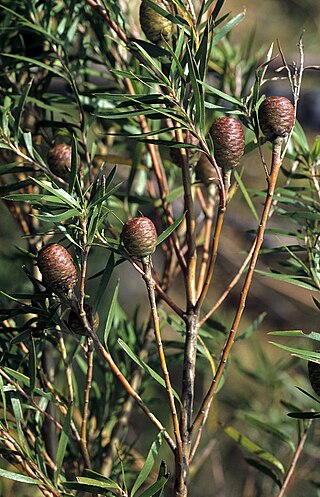
Leucadendron pondoense, the Pondoland conebush, is a flower-bearing shrub that belongs to the genus Leucadendron and forms part of the fynbos. The plant is native to the Eastern Cape where it occurs in the Pondoland from Port St. Johns to Port Edward.

Leucadendron rubrum, the spinning top, is a flower-bearing shrub belonging to the genus Leucadendron and forms part of the fynbos. The plant is native to the Western Cape, South Africa.
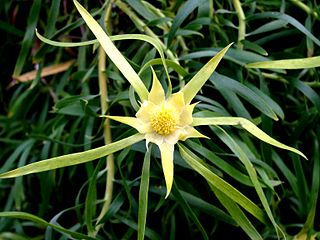
Leucadendron eucalyptifolium, the gum-leaved conebush, is a flower-bearing shrub belonging to the genus Leucadendron and forms part of the fynbos. The plant is native to the Western Cape and the Eastern Cape, where it occurs in the Potberg, Riversdal Plains, Langeberg, Outeniqua Mountains, Tsitsikamma Mountains, Kouga Mountains, Elandsberg, Swartberg, Waboomsberg, Warmwaterberg, Touwsberg, Rooiberg and Soetwaterberg. The shrub grows 4 m tall and bears flowers from July to October.

Leucadendron teretifolium, the needle-leaf conebush, is a flower-bearing shrub belonging to the genus Leucadendron and forms part of the fynbos. The plant is native to the Western Cape, South Africa.
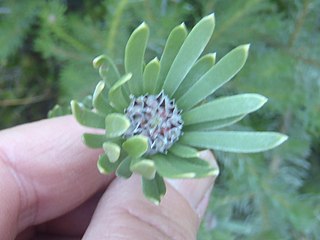
Leucadendron singulare, the Kammanassie conebush, is a flower-bearing shrub belonging to the genus Leucadendron and forms part of the fynbos. The plant is native to the Western Cape where it occurs in the Mannetjiesberg in the Kammanassie Mountains. The plant is rare. The shrub grows only 30 cm high and spreads out. It blooms in October. The plant dies after a fire, but the seeds survive. The seeds are stored in a toll on the female plant and fall out of the toll to the ground after two months where they are spread by ants. The plant is single-faced and there are separate plants with male and female flowers, which are pollinated by insects. The plant grows in crevices on peaks at heights of 2,000 - 2,150 m.

Leucadendron spissifolium subsp. spissifolium, the common spear-leaf conebush, is a flower-bearing shrub belonging to the genus Leucadendron and forms part of the fynbos. The plant is native to the Western Cape where it occurs on the Gifberg and from the Cederberg to the Cape Peninsula and Kogelberg to Kampscheberg in the Langeberg.
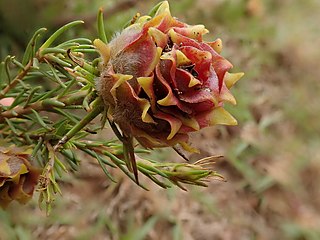
Leucadendron laxum, the Bredasdorp conebush, is a flower-bearing shrub belonging to the genus Leucadendron and forms part of the fynbos. The plant is native to the Western Cape, South Africa, where it occurs from Hermanus to Agulhas.
Leucadendron foedum, the Hopefield conebush, is a flower-bearing shrub belonging to the genus Leucadendron and forms part of the fynbos. The plant is native to the Western Cape, South Africa, and occurs from Piketberg to Hopefield.

Leucadendron pubescens, the grey conebush, is a flower-bearing shrub belonging to the genus Leucadendron and forms part of the fynbos. The plant is native to the Western Cape where it occurs on the Bokkeveldeskarp, Gifberg, Cederberg, Piketberg, Olifantsrivier, Sandveld, Koue Bokkeveld, Hexrivierberge, Bonteberg as well as the Kwadouwberg, Witteberg and Touwsberg.

Leucadendron nervosum, the silky-ruff conebush, is a flower-bearing shrub that belongs to the family Proteaceae. It is part of the South Africa fynbos vegetation type. The plant is native to the Western Cape, where it occurs on the Jonaskop in the Riviersonderend Mountains and Grootberg in the Langeberg. The shrub grows 1.5 m tall and flowers in September.


















